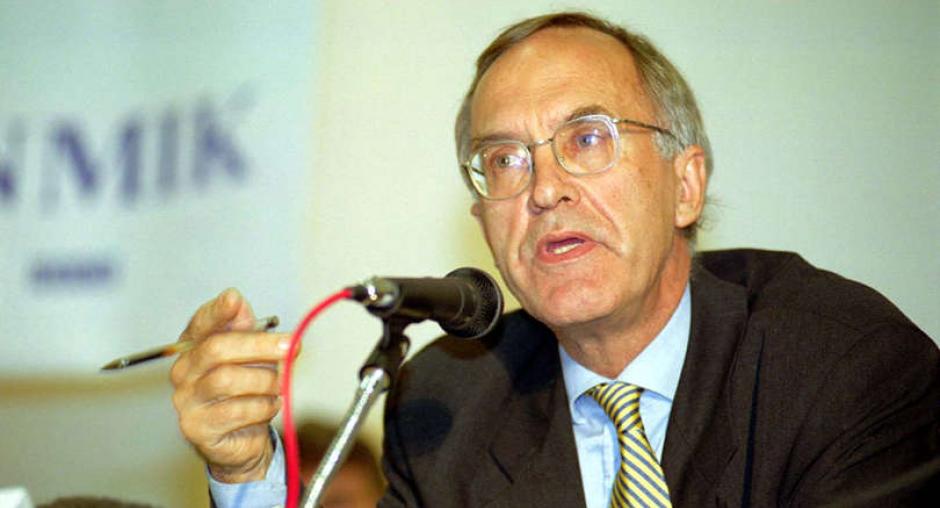Newsroom
Ambassador Daan Everts says farewell to Kosovo
PRISTINA 30 November 2001

Ambassador Everts speaking at a press conference. (Lubomir Kotek/OSCE) Photo details
PRISTINA, 30 November 2001 - Ambassador Daan Everts leaves Kosovo this weekend after two and a half years as head of the OSCE Mission.
Describing the experience as "very special", Ambassador Everts said there had been many challenges during his tenure. But, he said, he had always been guided by three principles.
The Ambassador encouraged Mission members to always show respect for Kosovo's traditions, culture and capacities. He spoke of his firm and constant belief in the importance of handing over the responsibilities of governance to the people of Kosovo - a process Ambassador Everts termed "Kosovarisation". And he pointed to the continuing need to strengthen institutions, such as the police, the civil service and the media, in the service of the public.
"Such bodies are fundamental to a functioning democracy. They are there to serve the people, not to act as political tools. It is essential that we continue to help them develop professional, people-friendly and non-political attitudes."
The OSCE Mission, said Ambassador Everts, had worked efficiently and effectively in its efforts to contribute to stability and the return of normality to Kosovo.
But, he added, there had been frustrations, anxieties and difficulties along the way. Although there has been a clear improvement in the security situation this year, Ambassador Everts said that too many people still do not enjoy full rights and freedoms. This, he said, was "unacceptable".
"I hope that in the future we will see - and I believe we will see - solidarity, sympathy and support amongst all the communities of Kosovo. I have no doubt that Kosovo has taken a decisive step towards integration with the democracies of Europe."
Ambassador Everts will now return to the Dutch foreign ministry, where he will be part of the OSCE Chairmanship team. Next year, the Netherlands will be part of the OSCE Troika of previous, present and future Chairs-in-Office. The Netherlands will take on the role of Chair in 2003.
Describing the experience as "very special", Ambassador Everts said there had been many challenges during his tenure. But, he said, he had always been guided by three principles.
The Ambassador encouraged Mission members to always show respect for Kosovo's traditions, culture and capacities. He spoke of his firm and constant belief in the importance of handing over the responsibilities of governance to the people of Kosovo - a process Ambassador Everts termed "Kosovarisation". And he pointed to the continuing need to strengthen institutions, such as the police, the civil service and the media, in the service of the public.
"Such bodies are fundamental to a functioning democracy. They are there to serve the people, not to act as political tools. It is essential that we continue to help them develop professional, people-friendly and non-political attitudes."
The OSCE Mission, said Ambassador Everts, had worked efficiently and effectively in its efforts to contribute to stability and the return of normality to Kosovo.
But, he added, there had been frustrations, anxieties and difficulties along the way. Although there has been a clear improvement in the security situation this year, Ambassador Everts said that too many people still do not enjoy full rights and freedoms. This, he said, was "unacceptable".
"I hope that in the future we will see - and I believe we will see - solidarity, sympathy and support amongst all the communities of Kosovo. I have no doubt that Kosovo has taken a decisive step towards integration with the democracies of Europe."
Ambassador Everts will now return to the Dutch foreign ministry, where he will be part of the OSCE Chairmanship team. Next year, the Netherlands will be part of the OSCE Troika of previous, present and future Chairs-in-Office. The Netherlands will take on the role of Chair in 2003.
